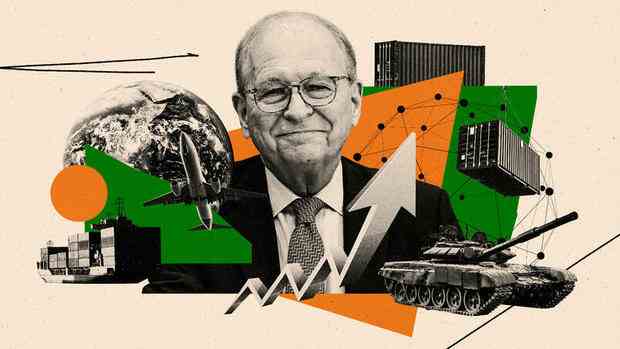Wolfgang Ischinger is a former ambassador to Washington and was head of the Munich Security Conference.
(Photo: Klawe Rzezcy)
In the book “Jim Button and Luke the Locomotive Driver” by Michael Ende there is the pseudo-giant – a figure that looks huge from a distance, but which gets smaller the closer it gets and is only dwarf-sized when you finally see it faces.
In the current debate about Russia’s war of aggression against Ukraine, we sometimes forget that Russia is nothing more than a make-believe giant – except for its landmass and its many thousands of nuclear weapons. The economic power of Russia is lower than that of Italy. Germany’s economic output is more than twice as large as Russia’s. The economic power of the 27 EU countries is seven times that of Russia.
If you add up the economic power of the entire West, including the USA, Canada and Great Britain, then the pseudo-giant Russia actually becomes an economic dwarf.
All in all, the economic prospects for Russia are gloomy, not only according to an analysis by the German Economic Institute (IW), if you take the effects of the sanctions and Russia’s future decline in raw material revenues together.
Russia’s demographics look even grimmer. The birth rate has been well below 2 percent for 20 years, the rate that would avoid population decline, and the life expectancy of a young Russian today is just about comparable to the life expectancy in the poorest developing countries. Added to this is the mass exodus from Russia since February 2022. Experts speak of almost a million emigrants.
Particularly highly educated professionals are leaving Russia
What is particularly serious is that among these emigrants are about 10 percent of the experts in Russia’s high-tech sector – an enormous bloodletting for a country that really needs nothing more urgently than internal modernization, away from the fatal overweighting of the raw materials sector.
Russia’s economy has been hit hard by sanctions and emigration.
(Photo: IMAGO/ITAR-TASS)
What does this mean for the conflict in which, according to Vladimir Putin, Russia sees itself in a historical confrontation with the West? Nothing other than that our confident response to Moscow should keep repeating a clear message: Not only do we have the superior strength to actually hold and support Ukraine for as long as necessary.
What’s more: Russia would lose a renewed arms race just as easily as the Soviet Union did 40 years ago, when Michael Gorbachev finally realized that he had no chance against the economic and military power USA, and then agreed to the initial disarmament agreement with Ronald Reagan. Is Putin aware that the suspension of the New Start Treaty that he has now ordered is actually nothing more than the bankrupt’s desperate rearing up shortly before the bankruptcy declaration?
This is how the Handelsblatt reports on the Ukraine war:
If we ask about the reasons for the Allied victory over Nazi Germany in World War II, then battles on the fronts in both the East and the West must have been important milestones. The decisive factor in the breakthrough of the Allies in 1944/45, however, was the enormous political, economic and armaments effort by the USA. They alone produced more armaments than the economies of all other combatants combined, not to mention the Manhattan nuclear project.
Don’t spill, but clog
Therein lie important lessons for the decisions now to be made in Berlin, Brussels and in the other partner countries. Unfortunately, it took a year in Germany – despite the proclaimed turning point, unfortunately a lost year – until the new defense minister realized that this war will only end successfully for Ukraine if we don’t mess around, but tack big ramping up ammunition and armaments production for us and our partners. It’s war in Europe and the turning point has only just begun!
Conclusion: Instead of presenting ourselves in embarrassing self-deterrence, we should be confident in seeing and treating Russia for what it really is: a make-believe giant who should not be intimidated by its repeated nuclear threats. Let’s stick with the courageous Ukrainians who, according to an opinion poll commissioned by the Munich Security Conference, responded with an overwhelming majority to the question of what they would do if Russia were to use a tactical nuclear weapon: fight on.
More: Christoph Heusgen on the Ukraine war – “Ultimately, there is only a solution with the end of the Putin regime”
